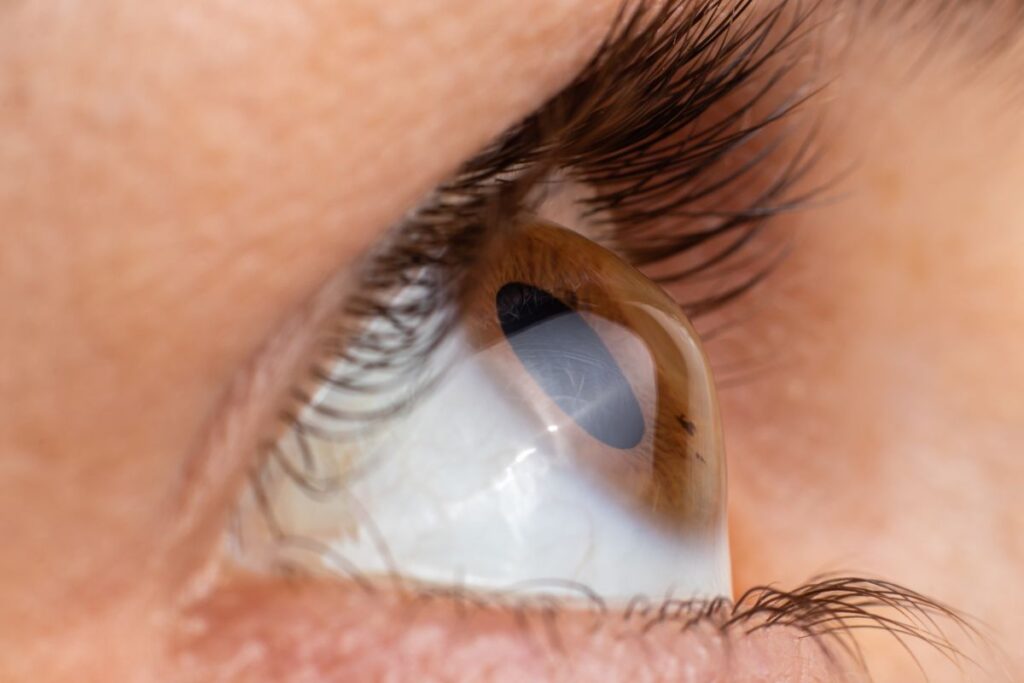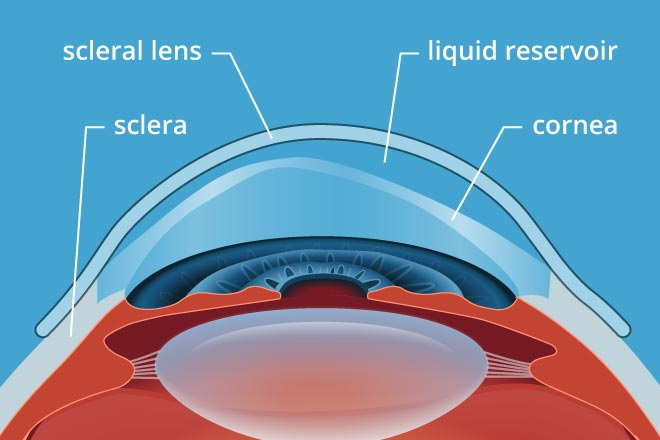Houston Keratoconus Specialists
Navigating the complexities of keratoconus requires not only advanced medical expertise but also a personalized touch. At Berkeley Eye Center, our Houston keratoconus specialists blend these elements to provide top-tier care for individuals grappling with this progressive eye condition. As a leading provider for keratoconus treatment, our focus extends beyond just medical solutions; we prioritize your overall well-being and vision health.
What Is Keratoconus?

Keratoconus is an eye condition marked by a progressive change in the shape of the cornea, the clear, dome-shaped surface that covers the front of the eye. In keratoconus, the cornea begins to thin and gradually bulges outward, forming a cone-like shape. This distortion of the cornea leads to a range of visual impairments, as it disrupts the way light enters the eye and is focused.
Visual Symptoms
Commonly, keratoconus leads to blurred vision, increased sensitivity to light, and glare. Many individuals also experience a significant change in their vision over time, requiring frequent updates to their eyeglass or contact lens prescriptions.
Progression
Typically, keratoconus begins during a person’s teenage years or early twenties and can progress for 10-20 years. The rate of progression can vary greatly among individuals.
Causes and Risk Factors
The exact cause of keratoconus is still not fully understood. It is believed to be due to a combination of genetic, environmental, and cellular factors. Habitual eye rubbing, certain eye diseases, and a history of keratoconus in the family may increase the risk.
Diagnosis
Early detection of keratoconus is crucial for effective management. At Berkeley Eye Center, we use advanced diagnostic tools to accurately assess the shape and thickness of the cornea. These include:
- Corneal Topography: This non-invasive imaging technique maps the surface curvature of the cornea, helping to detect early signs of keratoconus.
- Pachymetry: This test measures the thickness of the cornea, which is crucial in diagnosing and monitoring the progression of the condition.
Understanding keratoconus is the first step towards effective treatment. At Berkeley Eye Center, our Houston keratoconus doctors are equipped with the knowledge and technology to not only diagnose but also manage keratoconus effectively, helping patients maintain their vision and quality of life.
Keratoconus Treatment Options

At Berkeley Eye Center, we understand that each case is unique. That’s why we offer a range of customized keratoconus treatment options, designed to address the specific needs and progression of the condition for each individual. Our goal is to stabilize the cornea, improve vision, and enhance overall eye health.
One of the primary treatment options for keratoconus is scleral contact lenses. Larger in diameter, these lenses vault over the cornea and rest on the white part of the eye (sclera), offering comfort and improved vision.
Regular check-ups are also an essential part of any treatment plan in order to monitor the progression of keratoconus and adjust treatment plans as necessary. We also focus on educating patients about managing their condition, including advice on avoiding eye rubbing and protecting their eyes.
At Berkeley Eye Center, we are committed to providing the latest and most effective treatment options for keratoconus. Our team of specialists works closely with each patient to determine the best course of action, ensuring that every treatment plan is as unique as the patients we serve.
Lifestyle Tips for Managing Keratoconus
Alongside medical treatments, certain lifestyle adjustments can play a significant role in managing keratoconus and maintaining eye health:
- Avoid Eye Rubbing: Habitual eye rubbing can exacerbate keratoconus. If you experience itchy or irritated eyes, seek advice on suitable eye drops or treatments instead of rubbing your eyes.
- Maintain a Healthy Diet: While diet doesn’t directly impact keratoconus, overall good health can support eye health. Nutrients like Omega-3 fatty acids, found in fish and flaxseeds, are beneficial for maintaining general eye health.
- Protect Your Eyes: Wear sunglasses to protect your eyes from UV rays, which can further damage the cornea.
- Manage Allergies Effectively: Allergies can lead to eye rubbing. Work with your healthcare provider to keep any allergies under control.
- Mindful Activities: Engage in activities that reduce eye strain. Take regular breaks if you spend long hours in front of screens.
Incorporating these lifestyle tips into your daily routine can complement medical treatments and help you manage keratoconus more effectively.
Schedule an Appointment with a Houston Keratoconus Specialist Today
Your path to better eye health and managing keratoconus effectively starts here at Berkeley Eye Center. We understand the challenges you face and are committed to providing you with the best care possible. Don’t let keratoconus dictate your vision and quality of life, schedule an appointment today with one of our keratoconus specialists and explore your personalized treatment options.

